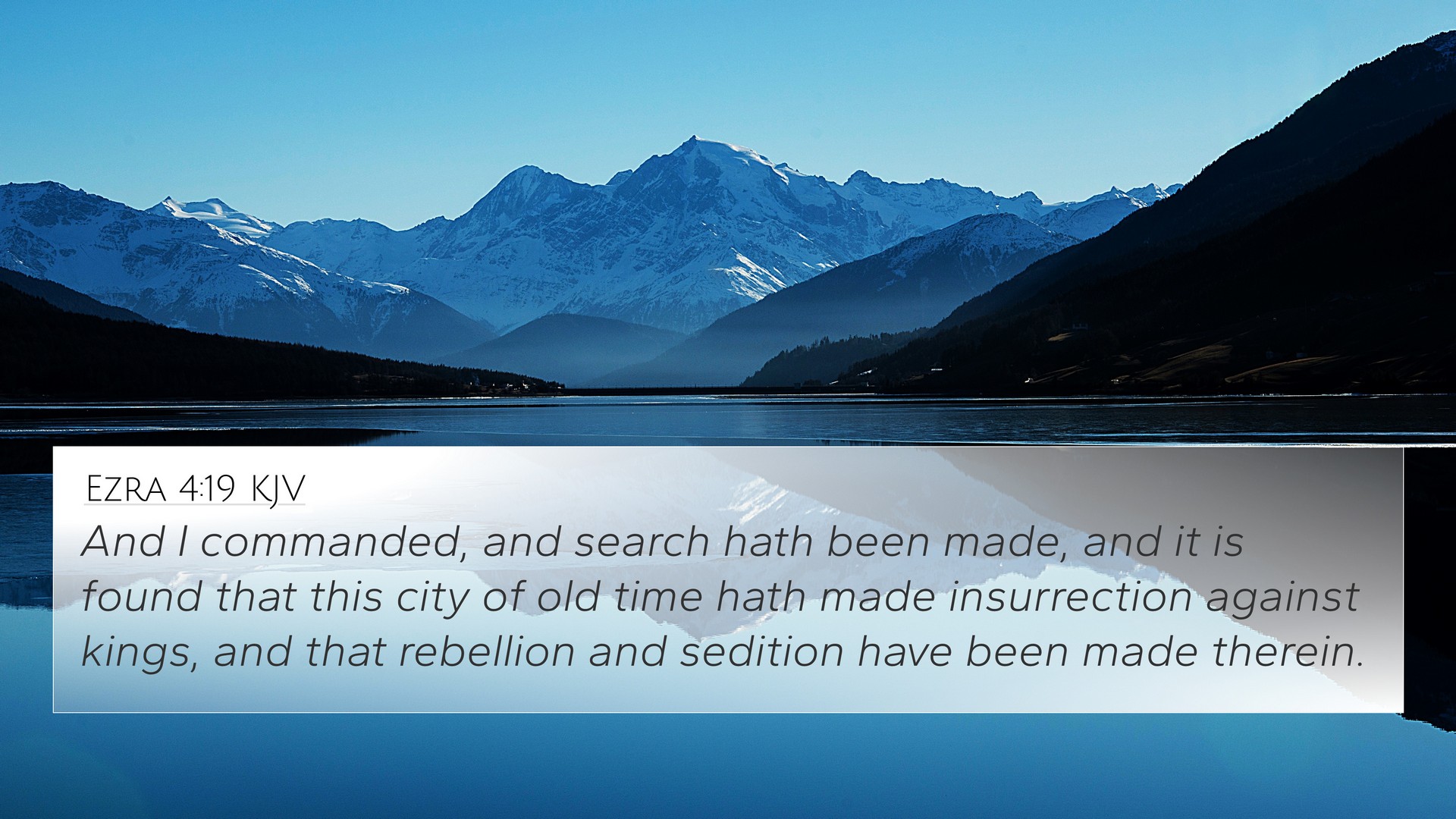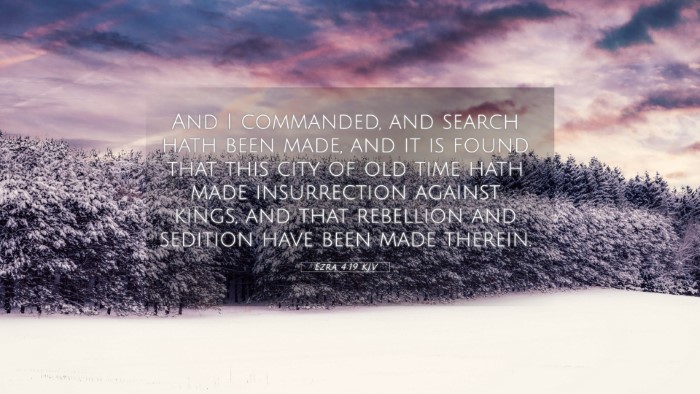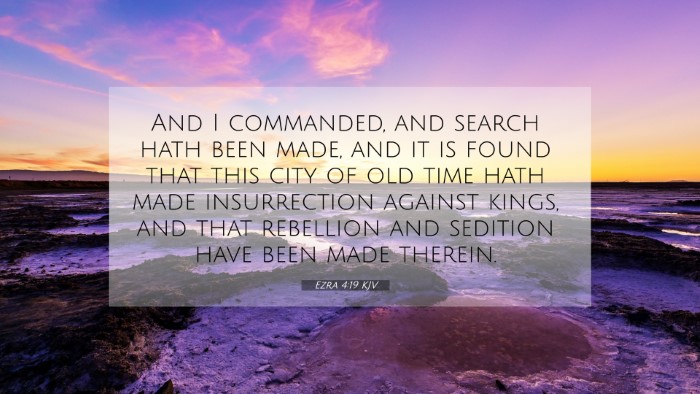Old Testament
Genesis Exodus Leviticus Numbers Deuteronomy Joshua Judges Ruth 1 Samuel 2 Samuel 1 Kings 2 Kings 1 Chronicles 2 Chronicles Ezra Nehemiah Esther Job Psalms Proverbs Ecclesiastes Song of Solomon Isaiah Jeremiah Lamentations Ezekiel Daniel Hosea Joel Amos Obadiah Jonah Micah Nahum Habakkuk Zephaniah Haggai Zechariah MalachiEzra 4:19 Similar Verses
Ezra 4:19 Cross References
And I commanded, and search hath been made, and it is found that this city of old time hath made insurrection against kings, and that rebellion and sedition have been made therein.
Uncover the Rich Themes and Topics of This Bible Verse
Listed below are the Bible themes associated with Ezra 4:19. We invite you to explore each theme to gain deeper insights into the Scriptures.
Ezra 4:19 Cross Reference Verses
This section features a detailed cross-reference designed to enrich your understanding of the Scriptures. Below, you will find carefully selected verses that echo the themes and teachings related to Ezra 4:19 KJV. Click on any image to explore detailed analyses of related Bible verses and uncover deeper theological insights.
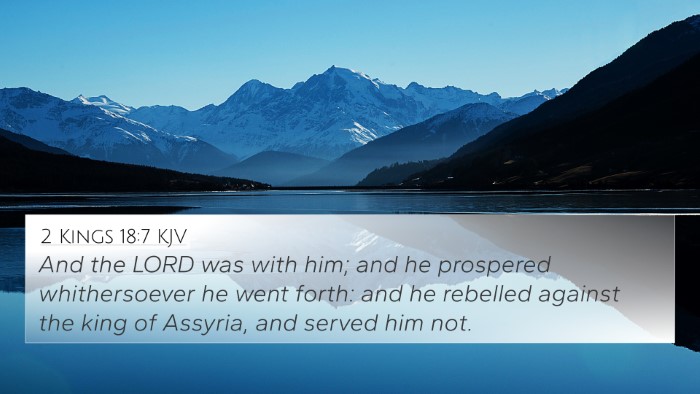
2 Kings 18:7 (KJV) »
And the LORD was with him; and he prospered whithersoever he went forth: and he rebelled against the king of Assyria, and served him not.
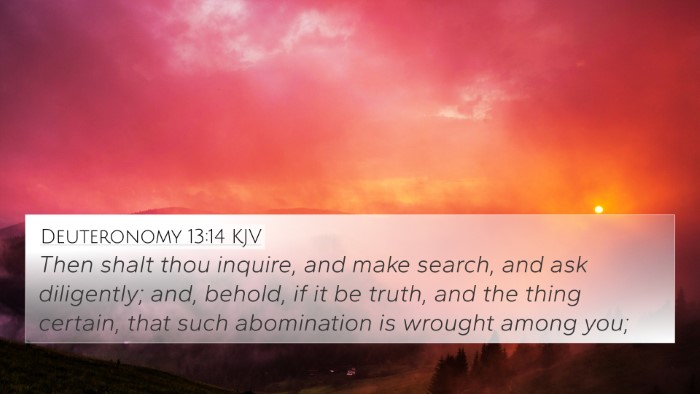
Deuteronomy 13:14 (KJV) »
Then shalt thou inquire, and make search, and ask diligently; and, behold, if it be truth, and the thing certain, that such abomination is wrought among you;
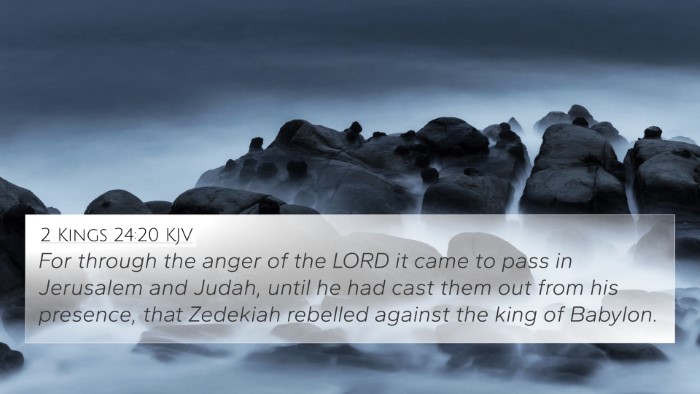
2 Kings 24:20 (KJV) »
For through the anger of the LORD it came to pass in Jerusalem and Judah, until he had cast them out from his presence, that Zedekiah rebelled against the king of Babylon.
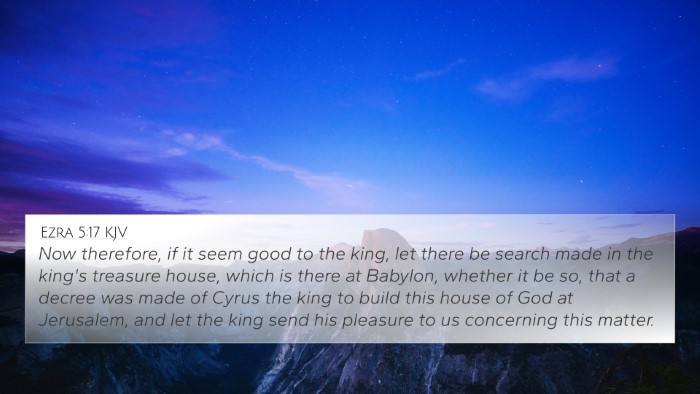
Ezra 5:17 (KJV) »
Now therefore, if it seem good to the king, let there be search made in the king's treasure house, which is there at Babylon, whether it be so, that a decree was made of Cyrus the king to build this house of God at Jerusalem, and let the king send his pleasure to us concerning this matter.
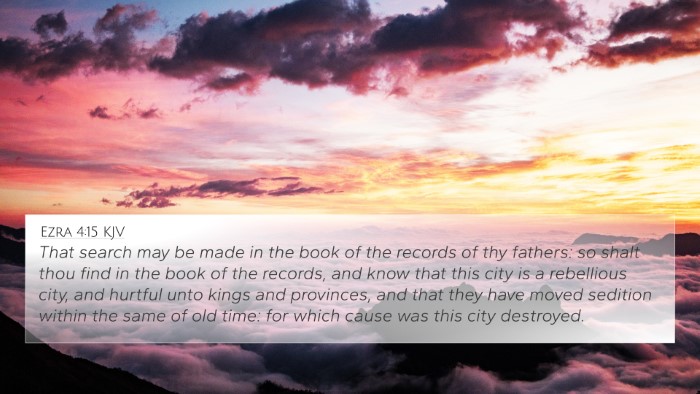
Ezra 4:15 (KJV) »
That search may be made in the book of the records of thy fathers: so shalt thou find in the book of the records, and know that this city is a rebellious city, and hurtful unto kings and provinces, and that they have moved sedition within the same of old time: for which cause was this city destroyed.

Proverbs 25:2 (KJV) »
It is the glory of God to conceal a thing: but the honour of kings is to search out a matter.
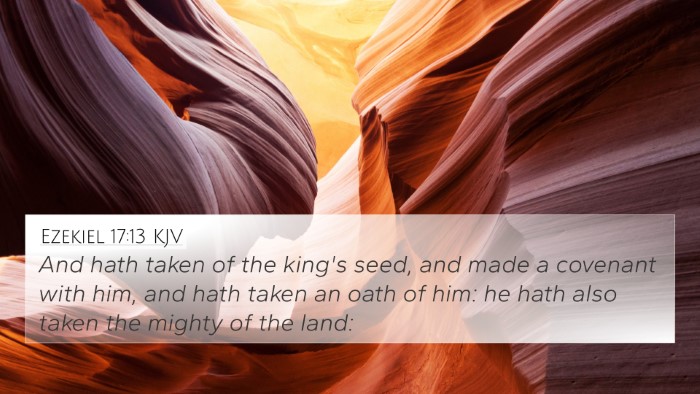
Ezekiel 17:13 (KJV) »
And hath taken of the king's seed, and made a covenant with him, and hath taken an oath of him: he hath also taken the mighty of the land:
Ezra 4:19 Verse Analysis and Similar Verses
Understanding Ezra 4:19
Verse: "And I gave commandment, and they made search in the house of the rolls, and found in the palace that it was written that a man named Cyrus had made a decree to build this house of God at Jerusalem." (Ezra 4:19)
This verse from Ezra provides important context regarding the rebuilding of the temple in Jerusalem and highlights the authority of Persian King Cyrus in facilitating this significant task for the Jewish people. It reflects a crucial moment in Jewish history, where God’s sovereignty is manifested through foreign rulers.
Commentary Summary
The insights into Ezra 4:19 from public domain commentaries such as those by Matthew Henry, Albert Barnes, and Adam Clarke reveal several layers of meaning:
- Divine Providence: The verse underscores God's providence, suggesting that what seems to be a political decree from Cyrus is part of God's overarching plan for Israel’s restoration. It reflects the theme of God's control over nations and leaders.
- Historical Verification: Albert Barnes emphasizes the importance of historical records, indicating that the discovery of Cyrus’s decree validates the Jewish claim to the land and their rights to rebuild the temple. This reflects the significance of preserving records and documents as a means of establishing truth.
- Fulfillment of Prophecy: Adam Clarke notes that this act aligns with the earlier prophecies about the restoration of the temple, showing the fulfillment of God’s promises to Israel. This illustrates a key theme in Scripture where God's plans are carried out faithful through generations.
- Role of Gentile Nations: Matthew Henry points out that God can use even Gentile rulers for His purposes. Cyrus’s decree is a reminder that God’s plans can transcend ethnic and national boundaries, which is a recurrent theme throughout the Scriptures.
- Encouragement for the Exiles: This finding provided renewed hope for the Jewish exiles, as they saw tangible support for their cause. It addresses the human need for encouragement and assurance of divine backing in efforts that seem daunting.
Bible Cross-References
To better understand the connections and implications of Ezra 4:19, below is a list of cross-referenced verses that relate to the context and themes found in this scripture:
- Isaiah 44:28: "That saith of Cyrus, He is my shepherd, and shall perform all my pleasure: even saying to Jerusalem, Thou shalt be built; and to the temple, Thy foundation shall be laid." - Highlights God’s declaration regarding Cyrus as His instrument.
- Isaiah 45:1: "Thus saith the LORD to his anointed, to Cyrus, whose right hand I have holden, to subdue nations before him..." - Speaks directly to God’s use of Cyrus in His redemptive plan.
- Jeremiah 29:10-11: "For thus saith the LORD, That after seventy years be accomplished at Babylon I will visit you, and perform my good word toward you..." - Connects to the promise of restoration after exile.
- Ezra 1:1-4: "Now in the first year of Cyrus king of Persia, that the word of the LORD by the mouth of Jeremiah might be fulfilled..." - Details the initial decree to return and build.
- Haggai 1:8: "Go up to the mountain, and bring wood, and build the house; and I will take pleasure in it, and I will be glorified, saith the LORD." - Encourages the rebuilding efforts with divine backing.
- Zechariah 1:16: "Therefore thus saith the LORD; I am returned to Jerusalem with mercies: my house shall be built in it." - Affirms God’s intent to restore His dwelling among His people.
- Matthew 2:1: "Now when Jesus was born in Bethlehem of Judaea in the days of Herod the king, behold, there came wise men from the east to Jerusalem." - A New Testament perspective reflecting the continuous unfolding of God’s plan initiated during the time of Ezra and Cyrus.
Thematic Connections and Interpretations
The exploration of Ezra 4:19 reveals much about the interconnectedness of the Bible through historical, theological, and prophetic themes. Some important themes include:
- Restoration: The overarching theme of restoration resonates deeply from Ezra to the Gospels, showcasing God’s faithfulness to His covenant people.
- Sovereignty of God: God's absolute sovereignty is a vital theme, emphasized through His use of secular leaders to achieve divine purposes.
- Hope and Encouragement: The restoration of Jerusalem brings hope to the disenfranchised. The continued support through decrees serves as a reminder of God's continuous presence and assistance in times of need.
- Historical Context: Understanding the historical context in which these events occur is essential for grasping the significance of the decree and its implications for the Jewish identity.
Practical Application
The insights gained from examining Ezra 4:19 through the lens of these commentaries and cross-references can inspire believers in their faith journey:
- Biblical Assurance: Just as the Jews found assurance in the decree of Cyrus, believers today can find confidence in God's promises found throughout scripture.
- God’s Use of All Circumstances: The story exemplifies that God can use various circumstances and individuals to fulfill His divine plans, encouraging believers to trust in His greater purpose.
- Encouragement to Rebuild: Believers are encouraged to rebuild their lives and relationships based on divine principles, mirroring the physical rebuilding of the temple.
Conclusion
Ezra 4:19 serves as a profound reminder of God’s sovereignty, the importance of historical records, and the necessity for believers to grasp the full depth of Scripture through cross-referencing its themes and stories. The connections between this passage and other Bible verses exemplify the rich tapestry of God's work through history, providing guidance and assurance to those who follow Him.
